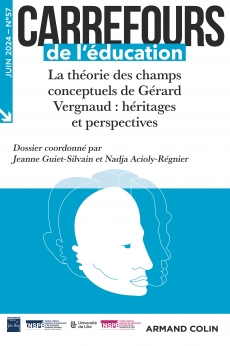
CARREFOURS DE L'ÉDUCATION N°57 (1/2024)
Pour acheter ce numéro, contactez-nous
Recevez les numéros de l'année en cours et accédez à l'intégralité des articles en ligne.
La théorie des champs conceptuels, bien que son origine soit liée à la didactique des mathématiques, a trouvé des applications dans de nombreux autres domaines de la connaissance. Dans cet article, nous présentons une étude de cas portant sur la construction des concepts de chaleur et de température afin de discuter de l’influence des invariants opératoires sur la conceptualisation. Notre objectif est d’examiner comment la Théorie des Champs Conceptuels peut établir un lien entre l’épistémologie génétique et la psychologie sociohistorique. Pour ce faire, nous mettons en avant une unité d’analyse en conceptualisation qui intègre des aspects intra-subjectifs et culturels. En tenant compte de ces aspects, nous apportons une compréhension plus approfondie des mécanismes sous-jacents à la construction des concepts scientifiques. En conclusion, nous soutenons que la Théorie des Champs Conceptuels nous offre une perspective intégrative qui enrichit notre compréhension des processus de conceptualisation.
The theory of conceptual fields, even though its origin is linked to the didacticism of mathematics, has found applicationss in a variety of other fields of knowledge. This paper presents a case study regarding the construction of the concepts of heat and temperature in order to discuss the influence of operational invariants on conceptualisation. Our purpose is to examine how the theory of conceptual fields can establish a link between genetic epistemology and sociohistorical psychology. In order to do this, we bring to the fore a unit of anslysis in conceptualisation which includes intrasubjective and cultural aspects. By including these aspects, we bring a deeper understanding of the mechanisms underrlying the construction of scientific mechanisms. We conclude that the Theory of concepdtual fields offers an integrative perspective which has enriched our understanding of conceptualisation processses.